初中英语笔记大全精华版,英语初中三年全部知识点归纳可打印
【最新推荐】初中英语笔记(精华版) (1)
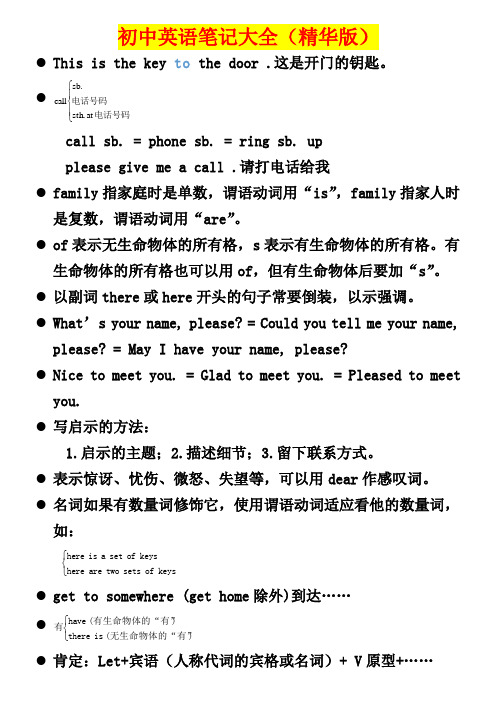
初中英语笔记大全(精华版)● This is the key to the door .这是开门的钥匙。
● ⎪⎩⎪⎨⎧电话号码电话号码at .sth .sb call call sb. = phone sb. = ring sb. upplease give me a call .请打电话给我● family 指家庭时是单数,谓语动词用“is ”,family 指家人时是复数,谓语动词用“are ”。
● of 表示无生命物体的所有格,s 表示有生命物体的所有格。
有生命物体的所有格也可以用of ,但有生命物体后要加“s ”。
● 以副词there 或here 开头的句子常要倒装,以示强调。
● What’s your name, please? = Could you tell me your name, please? = May I have your name, please?● Nice to meet you. = Glad to meet you. = Pleased to meet you.● 写启示的方法:1.启示的主题;2.描述细节;3.留下联系方式。
● 表示惊讶、忧伤、微怒、失望等,可以用dear 作感叹词。
● 名词如果有数量词修饰它,使用谓语动词适应看他的数量词,如:● get to somewhere (get home 除外)到达……● ● 肯定:Let+宾语(人称代词的宾格或名词)+ V 原型+…… ⎩⎨⎧ keys of sets two are here keys of set a is here ⎩⎨⎧)无生命物体的“有”(is there )有生命物体的“有”( have 有否定:Don’t let +宾语+V 原型+……/Let + 宾语 + not + V 原型+……● have 表示“有”时才可以用来提问或写成否定“haven’t”。
● ●● 反身代词:myself (我自己) yourself (你自己) himself (他自己) herself (她自己) itself (它自己) ourselves (我们自己) yourselves (你们自己) themselves (他们自己)● How much + be + 商品?(答:It’s/They’re……) = What is the price of ……?(答:It ’s ……)● cent 美分 One dollar =100 cents● other(两者中的另一个) another (三者中的另一个)● 越接近物品本身性质的形容词越靠近物品,如:big blue hat ● 帮助某人做某事help sb. (to) do sth.help sb. with sth.with the help (n.) of sb. e.g. He studies math well, with ⎩⎨⎧⋯⋯⋯⋯? you will 问: )听话的人include 不(us Let ? we shall 问: )说话的人和听话的人(include s Let'the help of teacher.●一般将来时的一般形式:主语+will+动词原形+……●Can I help you? = What can I do for you? = (Is there)anything I can do for you?●●be动词不加动词原形●“hundred,thousand”与基数词一起表示具体数字时不加“s”。
初中三年英语全部知识点总结-中考复习必备资料
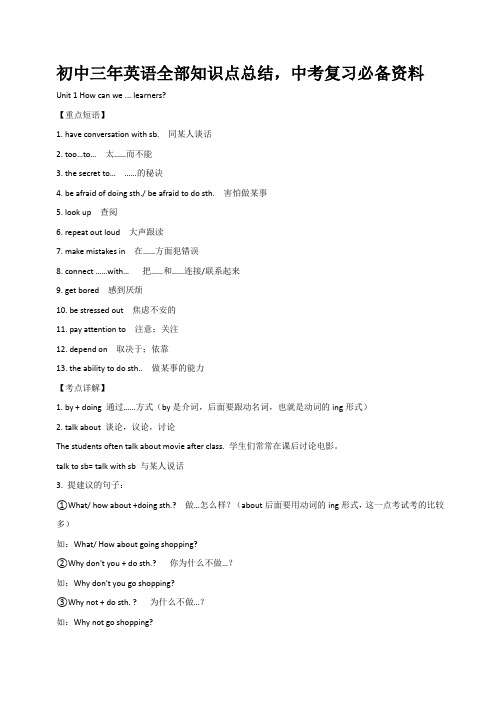
初中三年英语全部知识点总结,中考复习必备资料Unit 1 How can we ... learners?【重点短语】1. have conversation with sb. 同某人谈话2. too…to… 太……而不能3. the secret to… ……的秘诀4. be afraid of doing sth./ be afraid to do sth. 害怕做某事5. look up 查阅6. repeat out loud 大声跟读7. make mistakes in 在……方面犯错误8. connect ……with… 把……和……连接/联系起来9. get bored 感到厌烦10. be stressed out 焦虑不安的11. pay attention to 注意;关注12. depend on 取决于;依靠13. the ability to do sth.. 做某事的能力【考点详解】1. by + doing 通过……方式(by是介词,后面要跟动名词,也就是动词的ing形式)2. talk about 谈论,议论,讨论The students often talk about movie after class. 学生们常常在课后讨论电影。
talk to sb= talk with sb 与某人说话3. 提建议的句子:①What/ how about +doing sth.? 做…怎么样?(about后面要用动词的ing形式,这一点考试考的比较多)如:What/ How about going shopping?②Why don't you + do sth.? 你为什么不做…?如:Why don't you go shopping?③Why not + do sth. ? 为什么不做…?如:Why not go shopping?④Let's + do sth. 让我们做…...吧。
初中英语知识总结打印版
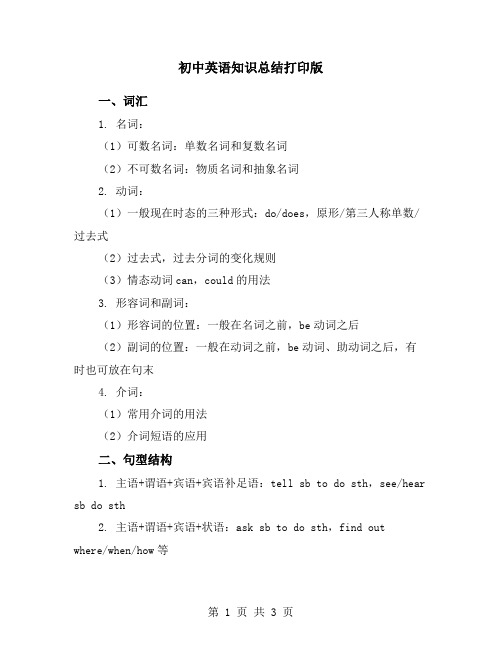
初中英语知识总结打印版一、词汇1. 名词:(1)可数名词:单数名词和复数名词(2)不可数名词:物质名词和抽象名词2. 动词:(1)一般现在时态的三种形式:do/does,原形/第三人称单数/过去式(2)过去式,过去分词的变化规则(3)情态动词can,could的用法3. 形容词和副词:(1)形容词的位置:一般在名词之前,be动词之后(2)副词的位置:一般在动词之前,be动词、助动词之后,有时也可放在句末4. 介词:(1)常用介词的用法(2)介词短语的应用二、句型结构1. 主语+谓语+宾语+宾语补足语:tell sb to do sth,see/hear sb do sth2. 主语+谓语+宾语+状语:ask sb to do sth,find outwhere/when/how等3. There be句型的应用:表示某地(某时)有某物,其主语不一定是人或物。
4. It is/was…句型的应用:it可用作形式主语或形式宾语,代替一个不定式、动名词或主语从句,使句子保持句式上的平衡。
句型中可以填入名词、形容词、过去分词、动词原形等。
三、时态和语态1. 一般现在时态:经常性、习惯性、客观真理。
强调动词所表示的动作或状态的特征,一般表示动作或状态的特点及动作的时间,是其他时态的基础。
其形式为:s + V(实意动词),如果实意动词是be 动词时,只将be动词换成am/is/are。
2. 现在进行时态:表示现阶段或现阶段发生的事情,常与everyday,often,last+一段时间连用。
其形式为:am/is/are + V-ing(现在分词)。
结构:①be动词一般位于句首。
②主语后跟现在分词作宾语。
③有时主语后跟的是动词的现在分词短语,在句中作定语,状语等。
④every d ay / week ,介词短语或时间状语置于句首。
④主语通常是名词或代词。
被动语态由“助动词be+及物动词的过去分词”构成。
助动词be随主语的人称和数而变化。
人教版初中英语三年重点短语和总结,史上最全!打印出来天天背!

人教版初中英语三年重点短语和总结,史上最全!打印出来天天背!人教七年级(上册)Starter Units 1-31. Good morning! 早上好!2. Good afternoon! 下午好!3. Good evening! 晚上好!4. —How are you?—I'm fine, thanks. / I'm OK.——你好吗?——我很好,谢谢。
/ 我还不错。
5. —What's this / that in English?—It's a / an ...——这个 / 那个用英语怎么说?——是……6. Spell it, please. 请拼写它。
7. —What color is it?—It's ...——它是什么颜色的?——它是……色的。
Unit 1Section A1. I'm ... 我是……2. Are you ...? 你是……吗?3. He / She is ... 他 / 她是……4.—Nice to meet you.—Nice to meet you, too.——见到你很高兴。
——见到你我也很高兴。
5. —What's your / his / her name?—My / His / Her name is ...——你 / 他 / 她叫什么名字?——我 / 他 / 她叫……Section B1. first name 名字2. last name 姓3. in China 在中国4. ID card 学生卡5. Is this your number?这是你的号码吗?6. —What's your telephone / phone number? —It's ...——你的电话号码是多少?——是……Unit 2Section A1. family photos 家庭照片2. This is / That is / These are / Those are ... 这是 / 那是 / 这些是 / 那些是……3. Who's she / he? 她 / 他是谁?4. Who are they? 他们是谁?5. Have a good day! 祝你过得愉快!6. I see. 我知道了。
知识 学霸初中三年精华英语笔记 ! 英语老师都惊呼“太全了”
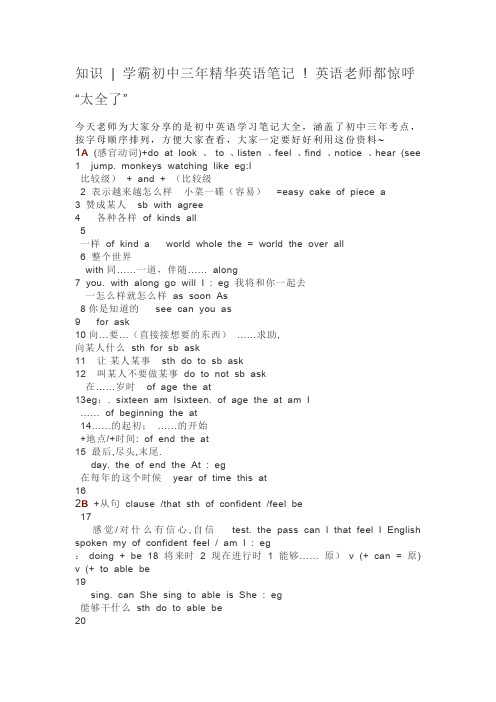
知识| 学霸初中三年精华英语笔记! 英语老师都惊呼“太全了”今天老师为大家分享的是初中英语学习笔记大全,涵盖了初中三年考点,按字母顺序排列,方便大家查看,大家一定要好好利用这份资料~1A(感官动词)+do at look 、to 、listen 、feel 、find 、notice 、hear (see 1 jump. monkeys watching like eg:I比较级)+ and + (比较级2 表示越来越怎么样小菜一碟(容易)=easy cake of piece a3 赞成某人sb with agree4 各种各样of kinds all5一样of kind a world whole the = world the over all6 整个世界with同……一道,伴随……along7 you. with along go will I : eg 我将和你一起去一怎么样就怎么样as soon As8你是知道的see can you as9 for ask10向…要…(直接接想要的东西)……求助,向某人什么sth for sb ask11 让某人某事sth do to sb ask12 叫某人不要做某事do to not sb ask在……岁时of age the at13eg:. sixteen am Isixteen. of age the at am I……of beginning the at14……的起初;……的开始+地点/+时间: of end the at15 最后,尽头,末尾.day. the of end the At : eg在每年的这个时候year of time this at162B+从句clause /that sth of confident /feel be17感觉/对什么有信心,自信test. the pass can I that feel I English spoken my of confident feel / am I : eg:doing + be 18 将来时 2 现在进行时 1 能够……原)v (+ can = 原) v (+ to able be19sing. can She sing to able is She : eg能够干什么sth do to able be20恐惧,害怕……sth (of do to afraid be21. night at out go to afraid I'm : eg被允许做什么do to allowed be22 我被允许看电视TV. watch to allowed I'm eg: 我应该被允许看电视TV. watch to allowed be should I生某人的气sb with angry be23 me with angry be Don't : eg为什么而生某人的气sth doing for sb with(at) angry be24和什么一样as…原级…as be25她和我一样高me as tall as is She : egto ashamed be26 远离from away be27 从……离开from away be28 对什么有害for bad be29eyes. your for bad is sun the in books Reading : eg 在太阳下看书对你的眼睛不好出生于born be30 忙于做什么事sth doing busy be忙于……sth with busy be当心;careful be32 小心和什么不一样from……different be33以……著名for famous be34 对某人友好sb to friendly be35 来自from come = from be36:eg. Bejing from is He. Bejing from comes He ? Bejing from he Is ? Bejing from come he Does装满……的of full be37 充满with filled be. water of full is glass The eg:. water with filled is glass Theglad+to+do/从句be38 将来时v(原)+ to going be39in well do = at(+doing) good be40 善于……在某方面善长,对什么有好处for good be41 English. your for good is aloud Reading : eg很高兴做某事do to happy be42 对某人有好处sb to helpful be43 . you to helpful is aloud Reading : eg . bady your to helpful is Exercising身体健康health good in be44 处于困难中trouble in be对某方面感兴趣in interested be46 迟到to late come = for late be47 上课迟到class for late Be eg:像……like be48 mother my like I'm : eg 生某人的气at mad be49 (制成以后看不见原材料) 由……制成from made be50由……制成(制成以后还看得见原材料) of made be51 表不确定sure not be52 参观to visit a on be53 受某人欢迎sb with popular be54 安静quiet be55表**的缩写for short be56 陶俊杰for short is 陶eg:生病在床bed in sick be57对...感到抱歉sb for sorry / be sth do to sorry be58 . you for sorry am I : eg很抱歉听到...(消息)that hear to sorry be 59很抱歉打扰sb trouble to sorry be60严于做某事sth doing in strict be61noles. obeying in strict He's : eg对某人要求严格sb with strict be62 有些学生对自己不严格themselves. with strict not are students Some eg:某方面对某人严格sth in sb with strict be63 被要求干什么do to supposed be64表确定sure be65 对做某事有信心sth doing of sure be66well. English learning of sure am I winning of sure is He eg: 对做某事有信心sth of sure be67我相信我的大脑(老师)teacher. /my head my of sure I'm eg: 对做某事有信心sth that sure be68 test. the pass can he that suer I'm eg:sth一定会做某事do to sure be69 我们一定会通过这次考试test. the pass to sure are We eg: 我们一定能学好英语well. English learn to sure Weare害怕……名/动doing + of terrified be70 害怕做某事sth do to terrified be71和什么一样…as same the be72 习惯做某事sth doing to used be73early. up getting to used is father My eg:我爸爸习惯早起。
初一至初三英语知识点总结
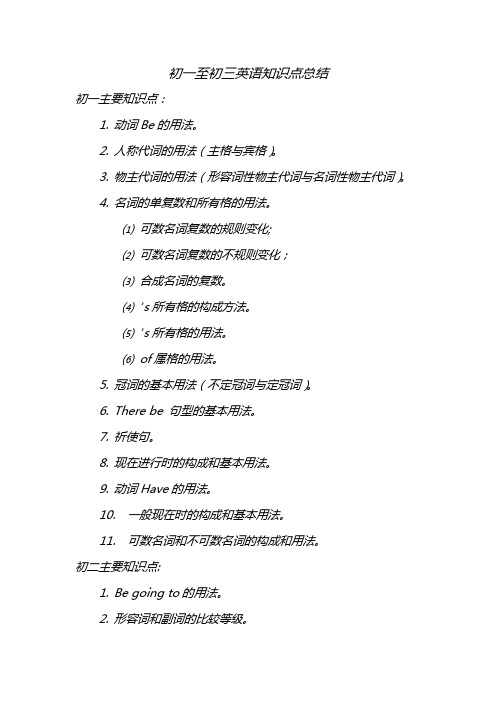
初一至初三英语知识点总结初一主要知识点:1.动词Be的用法。
2.人称代词的用法(主格与宾格)。
3.物主代词的用法(形容词性物主代词与名词性物主代词)。
4.名词的单复数和所有格的用法。
⑴可数名词复数的规则变化;⑵可数名词复数的不规则变化;⑶合成名词的复数。
⑷’s所有格的构成方法。
⑸’s所有格的用法。
⑹ of属格的用法。
5.冠词的基本用法(不定冠词与定冠词)。
6.There be 句型的基本用法。
7.祈使句。
8.现在进行时的构成和基本用法。
9.动词Have的用法。
10.一般现在时的构成和基本用法。
11.可数名词和不可数名词的构成和用法。
初二主要知识点:1.Be going to的用法。
2.形容词和副词的比较等级。
4.反意疑问句的用法。
5.一般将来时。
6.感叹句。
7.简单句的五种基本句型。
(1)主语 + 谓语;(2)主语 + 谓语(及物动词)+宾语;(3)主语 + 系动词 + 表语;(4)主语 + 谓语(及物动词) + 间接宾语 + 直接宾语;(5)主语 + 谓语(及物动词) + 宾语 + 宾语补足语。
8.情态动词can,may和must,have to的用法.9.时间状语从句和条件状语从句。
10.不定代词和副词的运用。
11.反身代词的用法。
12.并列句。
13.动词的过去进行时。
初三主要知识点:1.宾语从句。
2.现在完成时。
3.一般过去时与现在完成时的用法比较。
4.动词被动语态的结构与用法。
5.动词不定式的功能与用法。
7.过去完成时。
8.定语从句。
初中三年精华英语笔记

初中三年精华英语笔记今天为大家分享的是初中英语学习笔记大全,涵盖了初中三年考点,按字母顺序排列,方便大家查看,大家一定要好好利用这份资料~A1 (see 、hear 、notice 、find 、feel 、listen to 、look at (感官动词)+doeg:I like watching monkeys jump.2 (比较级+ and + 比较级)表示越来越怎么样3 a piece of cake =easy 小菜一碟(容易)4 agree with sb 赞成某人5 all kinds of 各种各样a kind of 一样6 all over the world = the whole world整个世界7 along with同……一道,伴随……eg : I will go along with you.我将和你一起去8 As soon as 一怎么样就怎么样9 as you can see 你是知道的10 ask for……求助, 向…要…(直接接想要的东西)11 ask sb for sth 向某人什么12 ask sb to do sth 让某人某事ask sb not to do 叫某人不要做某事13 at the age of 在……岁时eg:I am sixteen .I am at the age of sixteen.14 at the beginning of …………的起初;……的开始15 at the end of +地点/+时间:最后,尽头,末尾.eg : At the end of the day.16 at this time of year 在每年的这个时候B17 be /feel confident of sth /that clause +从句感觉/对什么有信心,自信eg : I am / feel confident of my spoken English I feel that I can pass the test.18 be + doing :1 现在进行时 2 将来时19 be able to (+ v 原) = can (+ v 原)能够……eg : She is able to sing She can sing.20 be able to do sth 能够干什么eg :she is able to sing.21 be afraid to do (of sth 恐惧,害怕……eg : I'm afraid to go out at night .22 be allowed to do 被允许做什么eg: I'm allowed to watch TV. 我被允许看电视I should be allowed to watch TV. 我应该被允许看电视23 be angry with sb 生某人的气eg : Don't be angry with me24 be angry with(at) sb for doing sth 为什么而生某人的气25 be as…原级…as和什么一样eg : She is as tall as me 她和我一样高26 be ashamed to27 be away from 远离28 be away from 从……离开29 be bad for 对什么有害eg : Reading books in the sun is bad for your eyes.在太阳下看书对你的眼睛不好30 be born 出生于31 be busy doing sth 忙于做什么事be busy with sth 忙于……32 be careful 当心;小心33 be different from……和什么不一样34 be famous for 以……著名35 be friendly to sb 对某人友好36 be from = come from 来自eg :He is from Bejing .He comes from Bejing .Is he from Bejing ?Does he come from Bejing ?37 be full of 装满……的be filled with 充满eg: The glass is full of water .The glass is filled with water .38 be glad+to+do/从句39 be going to + v(原)将来时40 be good at(+doing) = do well in在某方面善长, 善于……41 be good for 对什么有好处eg : Reading aloud is good for your English.42 be happy to do 很高兴做某事43 be helpful to sb 对某人有好处eg : Reading aloud is helpful to you . Exercising is helpful to your bady .44 be in good health 身体健康45 be in trouble 处于困难中eg : She is in trouble.46 be interested in 对某方面感兴趣47 be late for = come late to 迟到eg: Be late for class 上课迟到48 be like 像……eg : I'm like my mother49 be mad at 生某人的气50 be made from 由……制成(制成以后看不见原材料)51 be made of 由……制成(制成以后还看得见原材料)52 be not sure 表不确定53 be on a visit to 参观54 be popular with sb 受某人欢迎55 be quiet 安静56 be short for 表**的缩写eg: 陶is short for 陶俊杰57 be sick in bed 生病在床58 be sorry to do sth / be sorry for sb 对...感到抱歉eg : I am sorry for you .59 be sorry to hear that 很抱歉听到...(消息)60 be sorry to trouble sb 很抱歉打扰61 be strict in doing sth 严于做某事eg : He's strict in obeying noles.62 be strict with sb 对某人要求严格eg: Some students are not strict with themselves. 有些学生对自己不严格63 be strict with sb in sth 某方面对某人严格64 be supposed to do 被要求干什么65 be sure 表确定66 be sure of doing sth 对做某事有信心eg: He is sure of winning I am sure of learning English well.67 be sure of sth 对做某事有信心eg: I'm sure of my head /my teacher. 我相信我的大脑(老师)68 be sure that sth 对做某事有信心eg: I'm suer that he can pass the test.69 be sure to do sth一定会做某事eg: We are sure to pass the test. 我们一定会通过这次考试Weare sure to learn English well. 我们一定能学好英语70 be terrified of + 名/动doing 害怕……71 be terrified to do sth 害怕做某事72 be the same as …和什么一样73 be used to doing sth 习惯做某事eg: My father is used to getting up early.我爸爸习惯早起。
(完整word版)初中英语笔记大全(超级精华版)
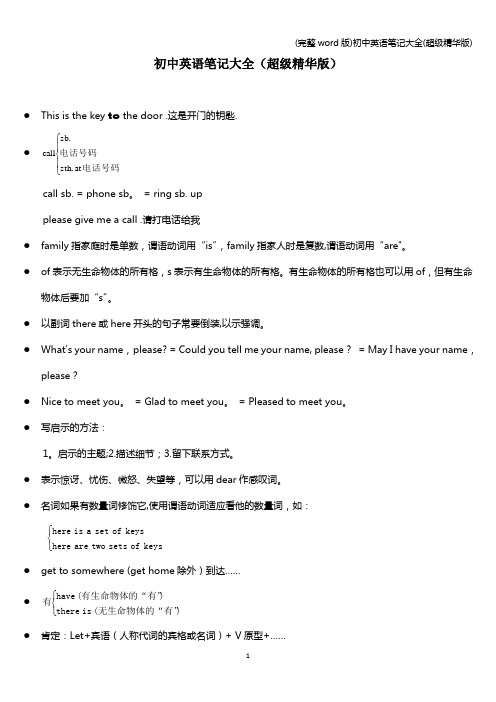
初中英语笔记大全(超级精华版)● This is the key to the door .这是开门的钥匙.●⎪⎩⎪⎨⎧电话号码电话号码at .sth .sb callcall sb. = phone sb 。
= ring sb. up please give me a call .请打电话给我● family 指家庭时是单数,谓语动词用“is ”,family 指家人时是复数,谓语动词用“are"。
● of 表示无生命物体的所有格,s 表示有生命物体的所有格。
有生命物体的所有格也可以用of ,但有生命物体后要加“s ”。
● 以副词there 或here 开头的句子常要倒装,以示强调。
● What's your name , please? = Could you tell me your name, please ? = May I have your name ,please ?● Nice to meet you 。
= Glad to meet you 。
= Pleased to meet you 。
● 写启示的方法:1。
启示的主题;2.描述细节;3.留下联系方式。
● 表示惊讶、忧伤、微怒、失望等,可以用dear 作感叹词。
● 名词如果有数量词修饰它,使用谓语动词适应看他的数量词,如:⎩⎨⎧keys of sets two are here keysof set a is here ● get to somewhere (get home 除外)到达…… ●⎩⎨⎧)无生命物体的“有”(is there )有生命物体的“有”( have 有 ● 肯定:Let+宾语(人称代词的宾格或名词)+ V 原型+……否定:Don’t let +宾语+V 原型+……/Let + 宾语 + not + V 原型+……● have 表示“有”时才可以用来提问或写成否定“haven’t”。
初中英语全部知识点总结(打印版)

初中英语全部知识点总结(打印版)初一年级(上)【知识梳理】I. 重点短语1. Sit down2. on duty3. in English4. have a seat5. at home6. look like7. look at8. have a look9. come on10. at work11. at school12. put on13. look after14. get up15. go shoppingII. 重要句型1. help sb. do sth.2. What abo ut…?3. Let’s do sth.4. It’s time to do sth.5. It’s time for …6. What’s…? It is…/ It’s…7. Where is…? It’s….8. How old are you? I’m….9. What class are you in? I’m in….10. Welcome to….11. What’s …plus…? It’s….12. I think…13. Who’s this? This is….14. What can you see?I can see….15. There is (are) ….16. What colour is it (are they)? It’s (They’re)…17. Whose …is this? It’s….18. What time is it? It’s….III. 交际用语1. Good morning, Miss/Mr….2. Hello! Hi!3. Nice to meet you. Nice to meet you, too.4. How are you? I’m fine, thank you/thanks. And you?5. See you. See you later.6. Thank you! You’re welcome.7. Goodbye! Bye!8. What’s your name? My name is ….9. Here you are. This way, please.10. Who’s on duty today?11. Let’s do.12. Let me see.IV. 重要语法1. 动词be的用法;2. 人称代词和物主代词的用法;3. 名词的单复数和所有格的用法;4. 冠词的基本用法;5. There be句型的用法。
(超详)初中英语知识点归纳汇总

初中英语知识归纳总结(打印版)第一课时名词一、概述1、名词的属性:表示人或事物的名称抽象概念的词叫名词。
2、名词分普通名词和专闻名词。
普通名词是表示某一类人或事物,或某种物体或抽象概念的名称。
如:teacher, desks, plates, milk, box等,专闻名词表示某一特定的人、事物、地方团体、党派、国家机关、语言、节日等专用的名称。
(运用)如:China, Chinese, Saturday, June, Green, Beijing, Olympic等。
(专闻名词的第一个字母要大写)二、可数名词与不可数名词1、可数名词是指表示人或事物,可以用数来计量的名词,有单复数之分。
如:glass-----glasses; book---- books2、不可数名词是指所表示的事物不能用数来计量。
如:paper, rice, water , milk, tea等。
3、有些名词在特定情况下由不可数变为可数名词。
Light travels faster than sound; (light:光芒,不可数)The lights are on. (light:灯,可数)4、不可数名词的量的表示不可数名词普通无法用数来计算,前面不能用a或an或数词来表示数量,它的量往往借助于容器来表示。
如:a glass of milk ------ four glasses of milka piece of paper ------ two pieces of papera bag of rice ------ three bags of rice三、可数名词的复数形式(识记、运用)1、可数名词在应用时有单复数之分,单数变复数有规矩变化和不规矩变化两种。
规矩变化2、少数名词有不规矩的变化形式policeman---policemen; man---men; woman---women;tooth---teeth; foot---feet; sheep---sheep; deer---deer;Japanese--- Japanese; Chinese --- Chinese; fish --- fish四、名词所有格(运用)名词的所有格是表示所有关系的形式,它也有构成上的变化。
初三英语重点知识归纳

初三英语重点知识归纳一、词汇1. 重点单词- 动词- achieve:达到;完成;成功。
例如:You can achieve your dreams if you work hard.(如果你努力工作,你就能实现你的梦想。
)- suggest:建议;提议。
suggest doing sth.(建议做某事),如:I suggest going for a walk.(我建议去散步。
)- remain:保持;依然;留下。
例如:She remained silent.(她保持沉默。
)- 名词- success:成功;成功的人或事。
形容词形式为successful,副词形式为successfully。
例如:His success made him famous.(他的成功使他出名了。
) - pollution:污染。
例如:Air pollution is a serious problem.(空气污染是一个严重的问题。
)- invention:发明;创造。
例如:The invention of the telephone changed our lives.(电话的发明改变了我们的生活。
)- 形容词- confident:自信的;有信心的。
be confident of sth.(对某事有信心),如:He is confident of passing the exam.(他有信心通过考试。
) - dangerous:危险的。
名词形式为danger。
例如:It is dangerous to swim in this river.(在这条河里游泳是危险的。
)- active:积极的;活跃的。
例如:He is an active student in class.(他在课堂上是一个积极的学生。
)2. 词汇拓展- able(形容词,能够的) - ability(名词,能力) - enable(动词,使能够)。
初中英语三年精华笔记整理

初中英语三年精华笔记整理,精简到极致,26天背会A第一天:1(see、hear、notice、find、feel、listen to、look at(感官动词)+do eg:I like watching monkeys jump.2(比较级+and+比较级)表示越来越怎么样3a piece of cake=easy小菜一碟(容易)4agree with sb赞成某人5all kinds of各种各样a kind of一样6all over the world=the whole world整个世界7along with同……一道,伴随……eg:I will go along with you.我将和你一起去8As soon as一怎么样就怎么样9as you can see你是知道的10ask for……求助,向…要…(直接接想要的东西)11ask sb for sth向某人什么12ask sb to do sth让某人某事ask sb not to do叫某人不要做某事13at the age of在……岁时eg:I am sixteen.I am at the age of sixteen.14at the beginning of…………的起初;……的开始15at the end of+地点/+时间:最后,尽头,末尾.eg:At the end of the day.16at this time of year在每年的这个时候B第二天:17be/feel confident of sth/that clause+从句感觉/对什么有信心,自信eg:I am/feel confident of my spoken English I feel that I can pass the test. 18be+doing:1现在进行时2将来时19be able to(+v原)=can(+v原)能够……eg:She is able to sing She can sing.20be able to do sth能够干什么eg:she is able to sing.21be afraid to do(of sth恐惧,害怕……eg:I m afraid to go out at night.22be allowed to do被允许做什么eg:I m allowed to watch TV.我被允许看电视I should be allowed to watch TV.我应该被允许看电视23be angry with sb生某人的气eg:Don t be angry with me24be angry with(at)sb for doing sth为什么而生某人的气25be as…原级…as和什么一样eg:She is as tall as me她和我一样高26be ashamed to27be away from远离第三天:28be away from从……离开29be bad for对什么有害eg:Reading books in the sun is bad for your eyes.在太阳下看书对你的眼睛不好30be born出生于31be busy doing sth忙于做什么事be busy with sth忙于……32be careful当心;小心33be different from……和什么不一样34be famous for以……著名35be friendly to sb对某人友好36be from=come from来自eg:He is from Bejing.He comes from Bejing.Is he from Bejing?Does he come from Bejing?37be full of装满……的be filled with充满eg:The glass is full of water.The glass is filled with water.38be glad+to+do/从句39be going to+v(原)将来时第四天:40be good at(+doing)=do well in在某方面善长,善于……41be good for对什么有好处eg:Reading aloud is good for your English.42be happy to do很高兴做某事43be helpful to sb对某人有好处eg:Reading aloud is helpful to you.Exercising is helpful to your bady.44be in good health身体健康45be in trouble处于困难中eg:She is in trouble.46be interested in对某方面感兴趣47be late for=come late to迟到eg:Be late for class上课迟到48be like像……eg:I m like my mother49be mad at生某人的气50be made from由……制成(制成以后看不见原材料)51be made of由……制成(制成以后还看得见原材料)52be not sure表不确定53be on a visit to参观54be popular with sb受某人欢迎第五天:55be quiet安静56be short for表**的缩写eg:陶is short for陶俊杰57be sick in bed生病在床58be sorry to do sth/be sorry for sb对...感到抱歉eg:I am sorry for you.59be sorry to hear that很抱歉听到...(消息)60be sorry to trouble sb很抱歉打扰61be strict in doing sth严于做某事eg:He s strict in obeying noles.62be strict with sb对某人要求严格eg:Some students are not strict with themselves.有些学生对自己不严格63be strict with sb in sth某方面对某人严格64be supposed to do被要求干什么65be sure表确定66be sure of doing sth对做某事有信心eg:He is sure of winning I am sure of learning English well.67be sure of sth对做某事有信心eg:I m sure of my head/my teacher.我相信我的大脑(老师)68be sure that sth对做某事有信心eg:I m suer that he can pass the test.69be sure to do sth一定会做某事eg:We are sure to pass the test.我们一定会通过这次考试Weare sure to learn English well.我们一定能学好英语70be terrified of+名/动doing害怕……第六天:71be terrified to do sth害怕做某事72be the same as…和什么一样73be used to doing sth习惯做某事eg:My father is used to getting up early.我爸爸习惯早起。
初中英语总复习知识点归纳(基本全了)
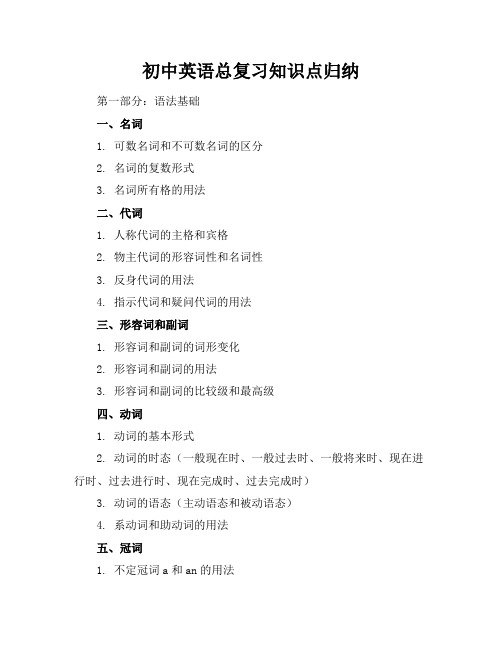
初中英语总复习知识点归纳第一部分:语法基础一、名词1. 可数名词和不可数名词的区分2. 名词的复数形式3. 名词所有格的用法二、代词1. 人称代词的主格和宾格2. 物主代词的形容词性和名词性3. 反身代词的用法4. 指示代词和疑问代词的用法三、形容词和副词1. 形容词和副词的词形变化2. 形容词和副词的用法3. 形容词和副词的比较级和最高级四、动词1. 动词的基本形式2. 动词的时态(一般现在时、一般过去时、一般将来时、现在进行时、过去进行时、现在完成时、过去完成时)3. 动词的语态(主动语态和被动语态)4. 系动词和助动词的用法五、冠词1. 不定冠词a和an的用法2. 定冠词the的用法3. 不使用冠词的情况六、连词1. 并列连词的用法2. 从属连词的用法七、介词1. 常用介词的用法2. 介词短语的结构和用法八、数词1. 基数词和序数词的用法2. 分数、小数和百分数的表达九、感叹词1. 感叹词的用法十、疑问词1. 疑问词的用法十一、句型结构1. 简单句的五种基本句型2. 并列句和复合句的结构和用法十二、主谓一致1. 主谓一致的原则2. 主谓一致的特殊情况十三、倒装句1. 完全倒装和部分倒装的区别2. 常见的倒装句型十四、省略句1. 省略句的结构和用法十五、强调句1. 强调句的结构和用法十六、虚拟语气1. 虚拟语气的用法十七、情态动词1. 情态动词的用法十八、非谓语动词1. 非谓语动词的分类和用法十九、固定搭配1. 常见的固定搭配二十、习惯用语和俚语1. 常见的习惯用语和俚语第二部分:词汇与短语一、词汇记忆方法1. 词根词缀记忆法2. 同义词和反义词记忆法3. 分类记忆法4. 联想记忆法二、常见词汇和短语1. 常用动词短语2. 常用形容词短语3. 常用介词短语4. 常用连词短语5. 常用固定搭配三、词汇辨析1. 形近词辨析2. 意思相近的词辨析3. 语境辨析四、词汇应用1. 词汇在句子中的应用2. 词汇在段落中的应用3. 词汇在文章中的应用五、词汇扩展1. 通过阅读扩展词汇2. 通过听力扩展词汇3. 通过口语和写作扩展词汇六、词汇复习策略1. 制定词汇复习计划2. 定期进行词汇测试3. 反复记忆和复习第三部分:阅读理解一、阅读技巧1. 快速阅读2. 精读3. 猜词技巧4. 理解文章主旨和大意5. 找出文章中的细节信息二、阅读题型1. 主旨大意题2. 细节理解题3. 推理判断题4. 词义猜测题5. 观点态度题三、阅读材料1. 故事类文章2. 议论文3. 说明文4. 应用文5. 新闻报道四、阅读理解策略1. 预览文章和首段2. 扫读文章找出关键词3. 仔细阅读理解文章内容4. 回答问题时注意关键词和语境5. 验证答案是否符合文章内容第四部分:写作技能一、写作技巧1. 确定写作目的和主题2. 拟定写作提纲3. 运用适当的句型和词汇4. 保持文章逻辑清晰5. 注意文章格式和标点符号二、写作题型1. 记叙文2. 议论文3. 说明文4. 应用文5. 日记和书信三、写作素材1. 人物描写2. 地点描写3. 事件描写4. 情感表达5. 观点陈述四、写作策略1. 多读优秀范文2. 多练习写作3. 请教老师和同学4. 反复修改和润色5. 保持写作兴趣和热情第五部分:听力理解一、听力技巧1. 预测听力内容2. 抓住关键词和关键信息4. 边听边记笔记5. 理解对话和独白的逻辑关系二、听力题型1. 简单听力理解题2. 听力细节理解题3. 听力推理判断题4. 听力主旨大意题5. 听力词义猜测题三、听力材料1. 对话2. 独白3. 新闻报道4. 广播节目5. 电影和电视剧片段四、听力理解策略1. 预览问题和选项2. 仔细听录音,注意关键词3. 根据听力内容进行推理和判断4. 选择最符合听力内容的答案5. 检查答案是否符合题意第六部分:口语表达一、口语技巧1. 准备话题和内容3. 保持语速适中4. 注意语法和词汇的准确性5. 保持自信和流畅二、口语题型1. 自我介绍2. 话题讨论3. 角色扮演4. 观点陈述5. 回答问题三、口语素材1. 日常生活话题2. 学校生活话题3. 社会热点话题4. 个人兴趣爱好话题5. 旅游和文化话题四、口语表达策略1. 多听多说,提高口语能力2. 模仿优秀的口语表达3. 与老师和同学进行口语练习4. 参加英语角和口语比赛5. 记录自己的口语表达,进行反思和改进第七部分:综合技能一、综合技巧1. 综合运用语法、词汇、阅读、写作、听力和口语等技能2. 注重语言的实际运用能力3. 提高语言的综合运用水平4. 培养跨文化交际能力5. 保持学习英语的兴趣和动力二、综合题型1. 完形填空2. 阅读理解3. 写作4. 听力理解5. 口语表达三、综合复习策略1. 制定综合复习计划2. 定期进行综合测试3. 反复练习和复习4. 请教老师和同学5. 保持学习英语的兴趣和热情。
初中英语笔记(精华版)

初中英语笔记大全(精华版)● This is the key to the door .这是开门的钥匙。
● ⎪⎩⎪⎨⎧电话号码电话号码at .sth .sb call call sb. = phone sb. = ring sb. upplease give me a call .请打电话给我● family 指家庭时是单数,谓语动词用“is ”,family 指家人时是复数,谓语动词用“are ”。
● of 表示无生命物体的所有格,s 表示有生命物体的所有格。
有生命物体的所有格也可以用of ,但有生命物体后要加“s ”。
● 以副词there 或here 开头的句子常要倒装,以示强调。
● What’s your name, please? = Could you tell me your name, please? = May I have your name, please? ● Nice to meet you. = Glad to meet you. = Pleased to meet you.● 写启示的方法:1.启示的主题;2.描述细节;3.留下联系方式。
● 表示惊讶、忧伤、微怒、失望等,可以用dear 作感叹词。
● 名词如果有数量词修饰它,使用谓语动词适应看他的数量词,如:⎩⎨⎧ keys of sets two are here keysof set a is here● get to somewhere (get home 除外)到达……● ⎩⎨⎧)无生命物体的“有”(is there )有生命物体的“有”( have 有 ● 肯定:Let+宾语(人称代词的宾格或名词)+ V 原型+……否定:Don’t let +宾语+V 原型+……/Let + 宾语 + not + V 原型+……● have 表示“有”时才可以用来提问或写成否定“haven’t”。
● ⎩⎨⎧⋯⋯⋯⋯? you will 问: )听话的人include 不(us Let ? we shall 问: )说话的人和听话的人(include s Let'myself (我自己) yourself (你自己) himself (他自己) herself (她自己) itself (它自己) ourselves (我们自己) yourselves (你们自己) themselves (他们自己)● How much + be + 商品?(答:It’s/They’re……) = What is the price of ……?(答:It ’s ……) ● cent 美分 One dollar =100 cents● other(两者中的另一个) another (三者中的另一个)● 越接近物品本身性质的形容词越靠近物品,如:big blue hat●帮助某人做某事help sb. (to) do sth.help sb. with sth.with the help (n.) of sb. e.g. He studies math well, with the help of teacher.●一般将来时的一般形式:主语+will+动词原形+……●Can I help you? = What can I do for you? = (Is there) anything I can do for you?●“hundred,thousand”与基数词一起表示具体数字时不加“s”。
初中英语 英语笔记(精华版)

初中英语笔记大全(精华版)● This is the key to the door .这是开门的钥匙。
● ⎪⎩⎪⎨⎧电话号码电话号码at .sth .sb call call sb. = phone sb. = ring sb. upplease give me a call .请打电话给我● family 指家庭时是单数,谓语动词用“is ”,family 指家人时是复数,谓语动词用“are ”。
● of 表示无生命物体的所有格,s 表示有生命物体的所有格。
有生命物体的所有格也可以用of ,但有生命物体后要加“s ”。
● 以副词there 或here 开头的句子常要倒装,以示强调。
● What’s your name, please? = Could you tell me your name, please? = May I have your name, please?● Nice to meet you. = Glad to meet you. = Pleased to meet you.● 写启示的方法:1.启示的主题;2.描述细节;3.留下联系方式。
● 表示惊讶、忧伤、微怒、失望等,可以用dear 作感叹词。
● 名词如果有数量词修饰它,使用谓语动词适应看他的数量词,如:⎩⎨⎧ keys of sets two are here keysof set a is here● get to somewhere (get home 除外)到达……● ⎩⎨⎧)无生命物体的“有”(is there )有生命物体的“有”( have 有 ● 肯定:Let+宾语(人称代词的宾格或名词)+ V 原型+……否定:Don’t let +宾语+V 原型+……/Let + 宾语 + not + V 原型+……● have 表示“有”时才可以用来提问或写成否定“haven’t”。
● ⎩⎨⎧⋯⋯⋯⋯? you will 问: )听话的人include 不(us Let ? we shall 问: )说话的人和听话的人(include s Let' ●● myself (我自己) yourself (你自己) himself (他自己) herself (她自己) itself (它自己) ourselves (我们自己) yourselves (你们自己) themselves (他们自己) ● How much + be + 商品?(答:It’s/They’re……) = What is the price of ……?(答:It ’s……)●cent 美分 One dollar =100 cents●other(两者中的另一个) another(三者中的另一个)●越接近物品本身性质的形容词越靠近物品,如:big blue hat●帮助某人做某事help sb. (to) do sth.help sb. with sth.with the help (n.) of sb. e.g. He studies math well, with the help of teacher.●一般将来时的一般形式:主语+will+动词原形+……●Can I help you? = What can I do for you? = (Is there) anything I can do for you? ●●●“hundred,thousand”与基数词一起表示具体数字时不加“s”。
初中英语笔记大全+超级精华版

初中英语笔记大全(超级精华版)● This is the key to the door .这是开门的钥匙。
●call sb. = phone sb. = ring sb. upplease give me a call .请打电话给我● family指家庭时是单数,谓语动词用“is”,family指家人时是复数,谓语动词用“are”。
● of表示无生命物体的所有格,s表示有生命物体的所有格。
有生命物体的所有格也可以用of,但有生命物体后要加“s”。
● 以副词there或here开头的句子常要倒装,以示强调。
● What’s your name, please? = Could you tell me your name, please? = May I have your name, please?● Nice to meet you. = Glad to meet you. = Pleased to meet you.● 写启示的方法:1.启示的主题;2.描述细节;3.留下联系方式。
● 表示惊讶、忧伤、微怒、失望等,可以用dear作感叹词。
● 名词如果有数量词修饰它,使用谓语动词适应看他的数量词,如:● get to somewhere (get home除外)到达……●● 肯定:Let+宾语(人称代词的宾格或名词)+ V原型+……否定:Don’t let +宾语+V原型+……/Let + 宾语 + not + V原型+……● have表示“有”时才可以用来提问或写成否定“haven’t”。
●●联系动词be动词+ adj.作表语感官动词look 看sound 听smell 闻taste 尝fell 触● 反身代词:myself(我自己) yourself(你自己) himself(他自己) herself(她自己) itself(它自己) ourselves(我们自己) yourselves(你们自己)themselves(他们自己)● How much + be + 商品?(答:It’s/They’re……) = What is the price of……?(答:It ’s……)● cent 美分 One dollar =100 cents● other(两者中的另一个) another(三者中的另一个)● 越接近物品本身性质的形容词越靠近物品,如:big blue hat● 帮助某人做某事help sb. (to) do sth.help sb. with sth.with the help (n.) of sb. e.g. He studies math well, with the help of teacher.● 一般将来时的一般形式:主语+will+动词原形+……● Can I help you? = What can I do for you? = (Is there) anything I can do for you?●● be动词不加动词原形● “hundred,thousand”与基数词一起表示具体数字时不加“s”。
初中英语笔记(精华版)(可编辑修改word版)

⎩初中英语笔记大全(精华版)● This is the key to the door .这是开门的钥匙。
⎧sb.⎪ ● call ⎨电话号码⎪sth. at 电话号码 call sb. = phone sb. = ring sb. upplease give me a call .请打电话给我● family 指家庭时是单数,谓语动词用“is”,family 指家人时是复数,谓语动词用“are”。
● of 表示无生命物体的所有格,s 表示有生命物体的所有格。
有生命物体的所有格也可以用 of ,但有生命物体后要加“s”。
●以副词 there 或 here 开头的句子常要倒装,以示强调。
●What’s your name, please? = Could you tell me your name, please? = May I have your name, please? ●Nice to meet you. = Glad to meet you. = Pleased to meet you. ● 写启示的方法:1. 启示的主题;2.描述细节;3.留下联系方式。
● 表示惊讶、忧伤、微怒、失望等,可以用 dear 作感叹词。
● 名词如果有数量词修饰它,使用谓语动词适应看他的数量词,如:⎧here is a set of keys ⎨ ⎩here are two sets of keys● get to somewhere (get home 除外)到达……⎧have (有生命物体的“有”) ● 有⎨⎩there is (无生命物体的“有”)● 肯定:Let+宾语(人称代词的宾格或名词)+ V 原型+……否定:Don’t let +宾语+V 原型+……/Let + 宾语 + not + V 原型+……● have 表示“有”时才可以用来提问或写成否定“haven’t”。
⎧Let's ⋯ ⋯(include 说话的人和听话的人) 问:shall we ? ●⎨ ⎩Let us ⋯ ⋯(不include 听话的人) 问:will you ?myself (我自己) yourself (你自己) himself (他自己) herself (她自己) itself (它自己) ourselves (我们自己) yourselves (你们自己) themselves (他们自己)● How much + be + 商品?(答:It’s/They’re……) = What is the price of……?(答:It ’s……) ● cent 美分 One dollar =100 cents● other(两者中的另一个) another (三者中的另一个)● 越接近物品本身性质的形容词越靠近物品,如:big blue hat●帮助某人做某事help sb. (to) do sth.help sb. with sth.with the help (n.) of sb. e.g. He studies math well, with the help of teacher.●一般将来时的一般形式:主语+will+动词原形+……●Can I help you? = What can I do for you? = (Is there) anything I can do for you?●“hundred,thousand”与基数词一起表示具体数字时不加“s”。
